#auditory learning
Explore tagged Tumblr posts
Text
Learning Techniques / Tips Based on the Four Predominant Learning Styles!!!
👀 Visual 👀
- Color code absolutely everything. The more organized by color, the better. Assign each class a color and buckle down. Let's say math is red, you're going to highlight, write, and have folders / notebooks solely in red. Trust me.
- Have a notebook for in class and another for at home. In the in class notebook, quickly write down your notes. When you get home, convert them into graphs, drawings, concept maps, etc. Keep words to a minimum, but have as many as you need to understand the visuals.
- Watch animated videos on topics related to your current studies.
- Have an agenda. I recommend this for anybody, but especially for visual learners.
- Use flashcards with visuals.
👂Auditory 👂
- Ask permission to audio record lectures. Emphasis on the ask part. Most teachers will let you. Respect their decision regardless.
- Listen to / make podcasts on the topics you're learning.
- Read out loud. This will help you retain what you're reading better.
- Listen to music while studying (as long as it doesn't distract you).
- Create songs and rhymes (mnemonics) for everything you can.
✋️Kinesthetic ✋️
- Fidget, take notes, stand up, etc. Make everything as hands-on as possible.
- Gamify absolutely everything. Also, role-playing is key. Get in a group and reenact the historical events you're learning about.
- Teach other people. This is helpful for anyone, but it's a whole different level for you.
- Chew gum (if permitted). Pick a flavor for each class (if you can). Every time you do something related to that class, chew that flavor. You'll end up associating that flavor with that information.
- Create a study group of like-minded learners! Once again, it is recommended in general, but especially for you.
📖 Read / Write 📖
- Take notes of the most minute details. And rewrite them a couple of times, if you're willing. Another type that I recommend color coding (and having two notebooks for each class) to.
- Read all the handouts and take notes on them.
- Have time set aside each day for rereading as much as possible. Handouts, notes, books, etc.
- Rewrite, summarize, and paraphrase the readings.
- Be active in your reading. Take notes. Underline. Highlight.
#studyblr#education#study blog#study#advice#learning#visual learning#auditory learning#kinesthetic learning#read / write learning
4 notes
·
View notes
Text

THE 4 LEARNING STYLE
1). VISUAL LEARNING : this learning style help you to absorb information by using image , diagram , charts and videos.
2). AUDITORY LEARNING : this learning style will also help you to understand better by listening to your recorded discussion
3). KINESTHETIC LEARNING : this learning style you will learn how to retain information thru the hands on activities then you will prefer to engage physically .
4). READING AND WRITING : this learning style is the one of the preferred ways individuals to absorb, process, and retain information. Learners who identify with this style excel in environments where they can engage with written text. They often prefer reading articles, books, and other written materials, as well as writing notes, essays, and reports to express their understanding of concepts.
0 notes
Text
I learn by reading
Daily writing promptWhat podcasts are you listening to?View all responses When it comes to podcasts, many people naturally assume that I must be immersed in the latest shows, using them as a source of knowledge or entertainment. But surprisingly, I don’t listen to podcasts—nor have I ever truly learned anything by listening alone. This is not an unconscious choice but an acknowledgement of a…

View On WordPress
#Auditory Learning#dailyprompt#dailyprompt-2116#information#Kinesthetic learning#knowledge#learning#mental map#mental organization#Raffaello Palandri#Reading#understanding#Visual Learning#writing
0 notes
Text
Identifying Students' Learning Styles
The concept of "learning styles" depends on the belief that learners often acquire knowledge through distinct and preferred modalities. Students will understand better if they are taught in a manner that conforms to their interests. Every student preferred different ways of learning for different subjects. Some learn best by listening; some have to do it to learn it, while others observe every step. To identify the most appropriate style, we will provide you with an overall idea of different learning styles that will prove beneficial for students learning.
Learning Styles
A learning style is a way that students prefer to comprehend, absorb, process, and retain information. The term "learning style" refers to the understanding that every learner learns differently. It influences how teachers teach, how students learn, and how the two collaborate. It serves as a pretty good indicator of how students interact with, perceive, and respond to the learning environment.
Types of Learning Styles
Every child has a technique they use to remember information while understanding concepts. Some of them make diagrams, some take notes, some listen to lectures, and so on. Scientists discover various learning styles to help students understand and learn new information because no single learning style fits all learners. These styles are found within the VARK model of student learning, which refers to the four types of learning styles: visual, auditory, reading/writing preference, and kinesthetic.
1. Visual Learning
The visual learning style refers to the spatial learning style. It is a way of learning in which information is presented in a visual format. With this type of learning style, students prefer to use graphics, images, maps, and colors to communicate thoughts and ideas. It has a significant impact on students’ brains as it helps them retain information for a longer period. In addition, the images can be captured based on spatial awareness, brightness, color, images, or any other visual information. The following are some characteristics of visual learning:
Visual learners can easily recall information in the form of words, numbers, sentences, and phrases.
They have strong visual-spatial skills, including shapes, angles, textures, dimensions, and sizes.
They have a keen awareness of the physical environment and visual media.
Aside from that, visual learners use their memory as a television screen with organized information.
2. Auditory Learning
Auditory learning is another style of learning in which students learn most efficiently through listening and hearing. Auditory learners often love music and learn best through their sense of hearing. They like to read out loud instead of being silent, even when they’re alone. Children who are auditory learners have a much stronger understanding that enables them to listen to their teachers when they explain something important. Some effective key points of auditory learning include:
Children can learn best by listening to information.
Aural learners have strong oral communication skills that allow them to carry on conversations.
They can remember details of information heard in lectures or collaborations.
Vocabulary and phrases can be developed through auditory learning.
study24hr.com has developed a comprehensive and multi-modality learning curriculum that enables learners to reach successful levels of understanding. study24hr.com guides students through personalized learning paths. The portal is designed to meet a vast array of learning needs, ensuring complete coverage of the needed talent and skills.
3. Reading and Writing Learning
Read and write learners learn primarily by writing and reading. They prefer to acquire information by reading textbooks, notes, and handouts. These learners make use of reference materials and dictionaries. Students and teachers tend to lean towards this style as it helps learners in terms of correlating, conceptualizing, analyzing, and acquiring knowledge. It has multiple characteristics, such as follows:
Reading and writing information are the most effective ways to learn.
Use headings, glossaries, definitions, and dictionaries to understand topics.
Generally, take verbatim notes in sessions.
Do well with essay tests and multiple-choice questions.
4. Kinesthetic Learning
Kinesthetic learning, also known as tactile learning, involves physical activity. It is a way of processing information through touch and movement. Kinesthetic learners use body gestures to better understand learning procedures. When they can interact with their surroundings, they retain information more effectively. Besides, students can learn best when shown presentations, videos, and simulations. This type of learning is best suited to situations like field trips, role plays, hands-on projects, and competitions. Additionally, the prominent characteristics of kinesthetic learning are as follows::
Full-body movement is the most effective way to learn.
Well-coordinated, with an acute sense of body movement and timing.
Learn well in activities involving performances, such as those involving actors, athletes, and dancers.
Work well in various fields such as sculpting, repairing, art, or working with tools.
To get the daily booster, please visit: Daily Booster Article| study24hr.com
Tips to identify the learning style
There are several ways students can assess their learning capabilities and determine what learning style best suits their needs. Here are various tips that learners can consider while trying to identify their learning style:
Examine different learning methods.
It may be helpful for learners to experiment with learning the same materials through different methods to determine which style best suits their needs.
Reflect on your learning experiences.
Students can consider their past learning experiences and think about what methods of acquiring knowledge have been most successful for them over time.
Ask your instructor or supervisor for feedback.
As an educator or student, you can request feedback about your learning style from an instructor or a supervisor, who can help you by offering insight into your ability to process information.
The Final Review
Remember, a learning style simplifies your preferred way of learning. It is very important to understand and identify your preferred style. You should be careful while choosing the most appropriate style that fits your needs. No matter what side of education you’re coming from, you can benefit yourself by understanding the best learning method. Therefore, enhance your learning skills and talent with the help of the VARK learning approach.
#students#learning style#learners#skills#knowledge#education#visual learning#reading#comprehension#success#writing#auditory learning
0 notes
Text
Dear disabled people in school, please know your rights! If you have an IEP or a 504 plan with your school, your accommodations are not suggestions; a teacher cannot refuse them. If a teacher, coach, or other school staff chooses to ignore or disregard your accommodations, you can and should report them to the school.
The school, under the Family Educational Rights and Privacy Act, will not/cannot tell the teacher that it was you who reported them, nor can the teacher question you or your class about being reported.
Remember it's against the law for the school or anyone representing/working for them to deny you your accommodations, no matter your age or grade, no matter the disability, and no matter how the school is funded.
#This is a reminder that extended time which lets you take longer on tests or turn in work late is an accommodation your school has to have#and no your accommodations don't suddenly stop applying for group projects#If you need an interpreter they have to find you a licensed one and they can't have them only there some of the time and not all of it#All doors must be wide enough for wheelchairs and all exterior doors must have a push button that is accessible and working#collage#high school#disabilties#education#learning#disability#accommodation#hard of hearing#autism#adhd#dyslexia#dyscalculia#dysgraphia#dysphasia#dyspraxia#auditory processing disorder#nonverbal learning disorder#nonverbal#mobility aid#learning disability#mental disability
602 notes
·
View notes
Text
Neurodiversity
Neurodivergence refers to variations in neurological functioning that diverge from what is considered typical or "neurotypical." While there is no single, universally agreed-upon list, neurodivergent disorders generally include conditions that affect cognition, behavior, perception, or social functioning.
1. Autism Spectrum Disorders (ASD)
Autism Spectrum Disorder (ASD)
Pathological Demand Avoidance (PDA) (controversial as a separate diagnosis)
Asperger’s Syndrome (outdated term, now part of ASD)
2. Attention-Deficit/Hyperactivity Disorder (ADHD)
ADHD (Predominantly Inattentive Type)
ADHD (Predominantly Hyperactive-Impulsive Type)
ADHD (Combined Type)
3. Learning Disabilities & Processing Disorders
Dyslexia (difficulty with reading and language processing)
Dyscalculia (difficulty with math and numerical processing)
Dysgraphia (difficulty with writing and fine motor skills)
Auditory Processing Disorder (APD)
Visual Processing Disorder (VPD)
Nonverbal Learning Disability (NVLD)
4. Intellectual Disabilities
Global Developmental Delay
Down Syndrome
Fragile X Syndrome
Williams Syndrome
Prader-Willi Syndrome
5. Communication Disorders
Social (Pragmatic) Communication Disorder
Speech Sound Disorder
Childhood Apraxia of Speech
Selective Mutism
6. Tic Disorders
Tourette Syndrome
Chronic Motor or Vocal Tic Disorder
Provisional Tic Disorder
7. Mental Health Conditions Often Considered Neurodivergent
Schizophrenia Spectrum & Other Psychotic Disorders
Schizophrenia
Schizoaffective Disorder
Schizotypal Personality Disorder
Delusional Disorder
Mood Disorders with Neurological Features
Bipolar Disorder
Major Depressive Disorder (long-term cases cause atrophy in brain regions like the hippocampus)
Dysthymia (Persistent Depressive Disorder)
Anxiety & Related Conditions
Obsessive-Compulsive Disorder (OCD)
Generalized Anxiety Disorder (GAD) (sometimes considered)
Panic Disorder (sometimes considered)
Trauma-Related Disorders (sometimes included)
Post-Traumatic Stress Disorder (PTSD) (when it significantly alters cognition and sensory processing)
Complex PTSD (CPTSD)
Dissociative Disorders
Dissociative Identity Disorder (DID)
Depersonalization/Derealization Disorder
Personality Disorders (Not all PDs)
Borderline Personality Disorder (BPD)
Antisocial Personality Disorder (ASPD)
Narcissistic Personality Disorder (NPD)
Schizotypal Personality Disorder (StPD)
8. Sensory Processing Differences
Sensory Processing Disorder (SPD) (not formally recognized in DSM-5 but widely acknowledged in neurodivergent communities)
9. Epilepsy & Neurological Conditions (sometimes considered)
Epilepsy
Migraines with Aura
Chronic Traumatic Encephalopathy (CTE)
10. Other Conditions Sometimes Considered Neurodivergent
Hyperlexia (advanced reading ability with comprehension difficulties)
Synesthesia (cross-wiring of sensory experiences)
Ehlers-Danlos Syndrome (EDS) (due to high comorbidity with neurodivergence)
Autoimmune Encephalitis (when it affects cognitive function)
Neurodivergence is a broad and evolving concept, with some conditions more widely accepted as neurodivergent than others. The core idea is that neurodivergent individuals experience the world in ways that differ from neurotypical standards, often due to innate neurological differences.
#neurodivergent#neurodiversity#neurodivergence#nd community#personality disorders#antisocial personality disorder#borderline personality disorder#narcissistic personality disorder#schizotypal personality disorder#psychology#mental health#disability pride#autism#adhd#asd#dyslexia#dyscalculia#dysgraphia#auditory processing disorder#apd#visual processing disorder#vpd#nonverbal learning disability#nvld#intellectual disability#developmental disability#down syndrome#fragile x syndrome#williams syndrome#prader-willi syndrome
184 notes
·
View notes
Text
Rewatching Andor s2 and somebody has probably said this before but giving Ghormans their own unique language is just an amazing decision.
Because what better way to show the Empire's brutality then them villainsing an entire people when the rest of the galaxy literally cannot understand the words of loss and grief and pain and anguish the Ghormans are saying?
Their most basic way of sharing news of the massacre of their people and way of life is taken away from them because they had clung to their culture while everyone else had it beaten into submission.
#the perceived threat of someone speaking a language you don't understand spun into existence to demonise a minority is an age-old tactic#human fear of the unknown exploited by divisive rhetoric#star wars#andor#andor season 2#andor series#andor spoilers#tho i admit as someone learning French listening to Ghor was an auditory nightmare (still loved it tho)#the ghorman massacre
33 notes
·
View notes
Text
okay but i am still obsessed with the little tidbit that anya is super knowledgeable in a random ancient language that's also explicitly referred to as dead. like what does that mean. did the scientists just make her really good at absorbing new languages for intel purposes. was she listening to people using a non-operative language to deliver secret information. it's not like she could've learned it during her years with her bio family because it's a DEAD language. like what the hell is the story implying.
#also the fact that she bombed the test bc she *misspelled* all the words indicates she absorbed it through auditory means#ie hearing people speak it rather than seeing the words written out#although it's also possible she learned the language both ways and just misspelled everything bc she's four#it's just so out of left field. what is this supposed to be hinting at#spy x family#anya forger#sage speaketh
219 notes
·
View notes
Text
In the Sandman, since Dream 'came into existence once lifeforms capable of dreaming appeared in the universe', I wonder what that lifeform is and what did it dream of. Like what is the first dream in the universe about.
#idk of the comics have anything about that though. I'm only on book 4#some post on twitter about how octopuses (which is like super different from human in evolution) can dream got me thinking#about dreams in animal and generally other lifeforms#from what we know there are few studies on dreams in animals#we can only study their behavior while they sleep or compare brain waves with human REM sleep or something of a sort#we don't exactly know if animals can dream the way we dream#dreams in animals are interesting to me because#it makes me wonder what these bizarre visual and auditory hallucinations the brain cooks up each night are and what are they for#we can only theorize that it organizes the brain and help with memory and learning and simulating events etc.#if many animals dream despite having very different ancestors then it's definitely something useful#I don't know how to explain but it's simply wild to think about. I don't know how it doesn't blow my stupid little brain#studying dream in animals might give us more insight to dreams in human I think#delete later
48 notes
·
View notes
Text
now that i have my hearing aids it's like im taking a class in sounds™ and i am so interested in the curriculum
#it's so fun learning about all the sounds that i haven't heard in years!#◇— ash's diary#hearing aids#hearing loss#hoh#hard of hearing#deaf#d/Deaf#hoh and deaf#auditory processing disorder
117 notes
·
View notes
Text
You know something ableist that's a common insult and shouldn't be? Saying someone must be stupid for spelling something wrong. I have a learning disability called auditory processing disorder. When I try to sound out words, I interpret them phonetically instead of how they should be spelled. In this exact post, I've already looked up more than 5 words. Some I previously knew how to spell, but when trying to spell was so wrong had to go to Google to figure it out.
Auditory Processing Disorder, dyslexia, and other learning disabilities often effect reading, spelling, and writing despite intelligence. I am almost at my bachelor's degree foe animal science and I have en I ugh credits for a humanities and sociology degree. I almost all A's and B's and I know I have to work twice as hard to achieve that. So if I spell something wrong or my grammer is wrong is NO indication of my intelligence. If I know one thing about myself is that I'm smart and I hold onto that dearly.
So say it with me: SPELLING IS NOT EQUAL TO INTELLIGENCE.
#rant#mia speaks#ableist#learning disability#auditory processing disorder#dyslexia#tired of this shit
16 notes
·
View notes
Text
gigs need to start putting the lyrics on the projectors like a children’s sing along
#i don’t get why this wouldn’t just be a win win#people will learn ur songs faster - lyrics ingrain in their head etc etc#good luck babe had this and i think it really added#even when i know the lyrics im fucking it up with the auditory processing#during amyl & the sniffers my voice was croaked out & i’d only get every other word in but i’d second guess myself#on songs I Know !
6 notes
·
View notes
Text
it’s disability pride month!
i hope those of you who struggle daily someday find solace, i hope those who cannot care for their disability find assistance, i hope those who have recently been diagnosed find peace, i hope those who may be able to cure their disability find a resolution. everyone is worthy and everyone is good, no matter your circumstances, of love and health.
#disability#disability pride#disability pride month#also i hope to everyone who is scared to call themselves disabled can find acceptance#i am technically disabled due to my learning disorder and muscle/joint weakness and auditory processing disorder and a slew of other things#but i dont feel like i cant call myself disabled since im not struggling as much as the next person#so ya know :’)
19 notes
·
View notes
Note
You seem like someone who if they find the slightest hint of an interesting character you immediately go down a rabbit hole about them and absorb as much information as possible
(i do this djdbdb smh)
You projecting onto me /j/lh
#I would if i had the motivation to lol#most of the time i go “oh! this is cool! I'll choose to learn thru osmosis and fuck it we ball”#occasionally I'll actually seek out info#i probably would be more like this if I comprehended more of what I read (chronic auditory learner whose eyes get impatient when reading)#ask game#ecliped jester#i see this as a compliment bc that means you think i am the kind of person who can commit to research
10 notes
·
View notes
Text
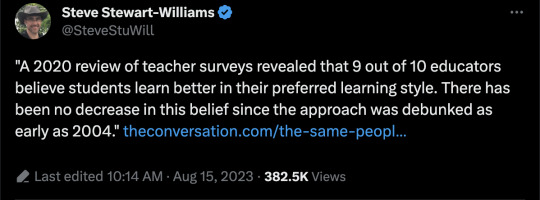
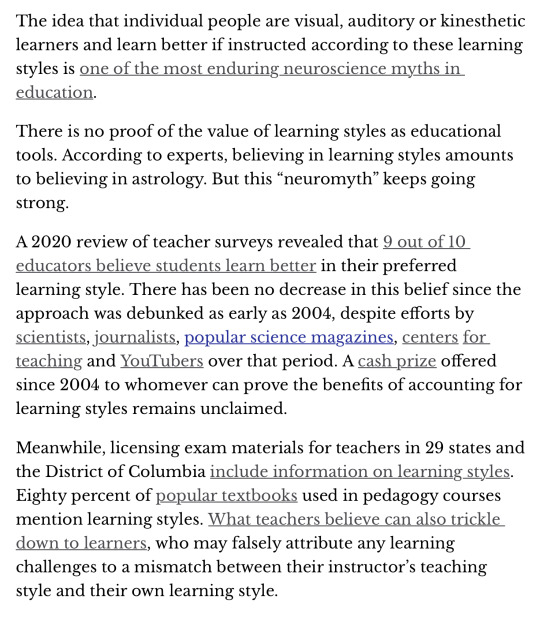
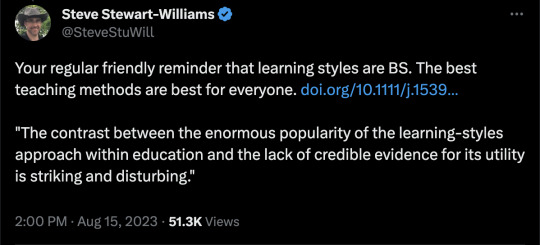
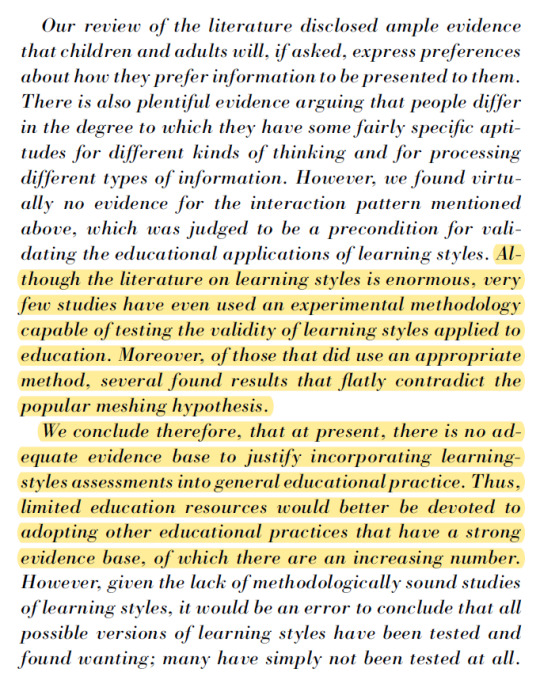
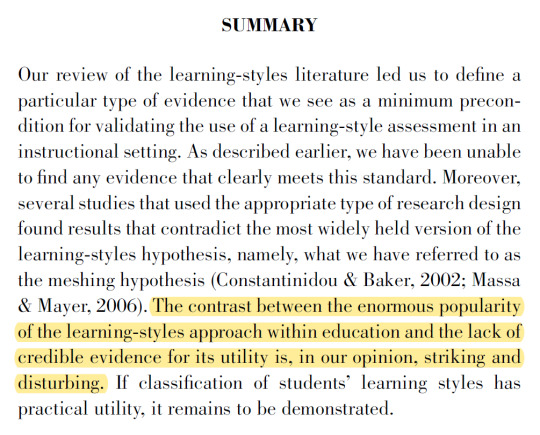
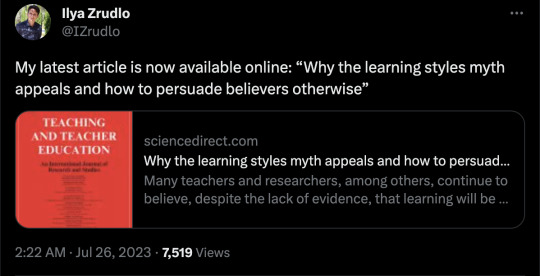
Abstract Many teachers and researchers, among others, continue to believe, despite the lack of evidence, that learning will be more effective if educators match their teaching approaches to students’ alleged learning styles. Scholars have called for more research on why the belief in learning styles is so appealing. This conceptual paper suggests four moral intuitions or sensibilities that underlie the appeal: (1) the desire for rational control, (2) our sense of justice, (3) the feeling that everyone is unique, and (4) reverence for the natural. Speaking to these intuitions could strengthen efforts to debunk the myth of learning styles in teacher education.
[..] Experts aren’t sure how the concept spread, but it might have had something to do with the self-esteem movement of the late ‘80s and early ‘90s. Everyone was special—so everyone must have a special learning style, too. Teachers told students about it in grade school. “Teachers like to think that they can reach every student, even struggling students, just by tailoring their instruction to match each student’s preferred learning format,” said Central Michigan University’s Abby Knoll, a PhD student who has studied learning styles. (Students, meanwhile, like to blame their scholastic failures on their teacher’s failure to align their teaching style with their learning style.)
Either way, “by the time we get students at college,” said the Indiana University professor Polly Husmann, “they’ve already been told ‘You’re a visual learner.’” Or aural, or what have you.
The thing is, they’re not. Or at least, a lot of evidence suggests that people aren’t really one certain kind of learner or another. In a study published last month in the journal Anatomical Sciences Education, Husmann and her colleagues had hundreds of students take the Vark questionnaire to determine what kind of learner they supposedly were. The survey then gave them some study strategies that seem like they would correlate with that learning style. Husmann found that not only did students not study in ways that seemed to reflect their learning style, those who did tailor their studying to suit their style didn’t do any better on their tests.
Husmann thinks the students had fallen into certain study habits, which, once formed, were too hard to break. Students seemed to be interested in their learning styles, but not enough to actually change their studying behavior based on them. And even if they had, it wouldn’t have mattered.
“I think as a purely reflective exercise, just to get you thinking about your study habits, [Vark] might have a benefit,” Husmann said. “But the way we’ve been categorizing these learning styles doesn’t seem to hold up.”
Another study published last year in the British Journal of Psychology found that students who preferred learning visually thought they would remember pictures better, and those who preferred learning verbally thought they’d remember words better. But those preferences had no correlation to which they actually remembered better later on—words or pictures. Essentially, all the “learning style” meant, in this case, was that the subjects liked words or pictures better, not that words or pictures worked better for their memories.
In other words, “there’s evidence that people do try to treat tasks in accordance with what they believe to be their learning style, but it doesn’t help them,” says Daniel Willingham, a psychologist at the University of Virginia. In 2015, he reviewed the literature on learning styles and concluded that “learning styles theories have not panned out.”
That same year, a Journal of Educational Psychology paper found no relationship between the study subjects’ learning-style preference (visual or auditory) and their performance on reading- or listening-comprehension tests. Instead, the visual learners performed best on all kinds of tests. Therefore, the authors concluded, teachers should stop trying to gear some lessons toward “auditory learners.” “Educators may actually be doing a disservice to auditory learners by continually accommodating their auditory learning style,” they wrote, “rather than focusing on strengthening their visual word skills.”
In our conversation, Willingham brought up another study, published in 2009, in which people who said they liked to think visually or verbally really did try to think that way: Self-proclaimed visualizers tried to create an image, and self-proclaimed verbalizers tried to form words. But, there was a rub, he said: “If you’re a visualizer and I give you pictures, you don’t remember pictures any better than anyone who says they’re verbalizer.”
This doesn’t mean everyone is equally good at every skill, of course. Really, Willingham says, people have different abilities, not styles. Some people read better than others; some people hear worse than others. But most of the tasks we encounter are only really suited to one type of learning. You can’t visualize a perfect French accent, for example.
==
Considering the sources of teacher training, Ed Schools, are extremely highly ideological, the perpetuation of this "neuromyth" is probably not an accident or misunderstanding.
These are the schools that have attached quasi-religious overtones to their preferred, but ineffective, process of teaching kids to read, and have been denying evidence-based methods for decades.
#learning styles#pseudoscience#education#corruption of education#neuroscience#myths#science#VARK#visual learner#auditory learner#reading learner#kinesthetic learner#junk science#religion is a mental illness
80 notes
·
View notes
Text
One actual drawback to developing an interest in smaller local artists as a probably low-intermediate language learner with shitty hearing/auditory processing: good luck finding published lyrics!
Brought to you by another afternoon of " I can only make out a few words and phrases here and there. But it sounds pretty cool, and I will of course try to sing along regardless."
#personal#mondegreens#no doubt abound#i am bad enough for that in my first language#language learning#hard of hearing#auditory processing
82 notes
·
View notes